There are many different food labels that contain information about how food was grown or processed. However, some labels can be misleading. Below are examples of labels to look for and ask questions about at the store or market where you see them.
Certified Labels
Organic
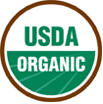 USDA’s National Organic Program regulates labeling requirements for organic agricultural products. Organic labels can be found on produce, dairy, meat, processed foods, condiments and beverages. Food products labeled “organic” must contain at least 95% organic ingredients with no synthetic growth hormones, antibiotics, pesticides, biotechnology, synthetic ingredients or irradiation used in production or processing. Products that contain at least 70 percent organic ingredients and are produced without synthetic methods are labeled “made with organic ingredients,” though they cannot use the USDA organic seal on their packaging.
USDA’s National Organic Program regulates labeling requirements for organic agricultural products. Organic labels can be found on produce, dairy, meat, processed foods, condiments and beverages. Food products labeled “organic” must contain at least 95% organic ingredients with no synthetic growth hormones, antibiotics, pesticides, biotechnology, synthetic ingredients or irradiation used in production or processing. Products that contain at least 70 percent organic ingredients and are produced without synthetic methods are labeled “made with organic ingredients,” though they cannot use the USDA organic seal on their packaging.
Certified Naturally Grown
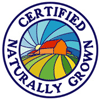 This label denotes the food was grown using the same standards as those for organic, but not on a farm actually certified by the National Organic Program of the USDA. Some farmers have criticized the cost and process they need to go through to participate in the USDA’s organic program, so this is an alternative, non-governmental certification system where other farmers act as inspectors in a program administered by a non-profit organization called Certified Naturally Grown. “Natural” is a term present on a lot on food products (some of which you’d hardly call natural at all), so look closely at the label. The Certified Naturally Grown label indicates that someone is certifying that it is indeed natural, rather than just using the word “Natural” for marketing purposes.
This label denotes the food was grown using the same standards as those for organic, but not on a farm actually certified by the National Organic Program of the USDA. Some farmers have criticized the cost and process they need to go through to participate in the USDA’s organic program, so this is an alternative, non-governmental certification system where other farmers act as inspectors in a program administered by a non-profit organization called Certified Naturally Grown. “Natural” is a term present on a lot on food products (some of which you’d hardly call natural at all), so look closely at the label. The Certified Naturally Grown label indicates that someone is certifying that it is indeed natural, rather than just using the word “Natural” for marketing purposes.
Fair Trade
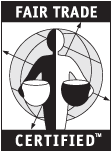 Fair trade standards are enforced by the Fairtrade Labeling Organizations International (FLO) (in the U.S. by Fair Trade USA). Fair trade products must be produced in accordance with the following guidelines: Workers must receive fair wages, safe and equitable working conditions and the right to join trade unions; child or forced labor is completely prohibited. Crops must also be grown, produced and processed in a manner that supports social development, economic development and environmental development. Fair trade standards have been established for coffee, tea, cocoa, honey, bananas, juices, cotton, flowers, gold, rice, spices and herbs, sports balls, wine, composite products, fresh fruit and sugar.
Fair trade standards are enforced by the Fairtrade Labeling Organizations International (FLO) (in the U.S. by Fair Trade USA). Fair trade products must be produced in accordance with the following guidelines: Workers must receive fair wages, safe and equitable working conditions and the right to join trade unions; child or forced labor is completely prohibited. Crops must also be grown, produced and processed in a manner that supports social development, economic development and environmental development. Fair trade standards have been established for coffee, tea, cocoa, honey, bananas, juices, cotton, flowers, gold, rice, spices and herbs, sports balls, wine, composite products, fresh fruit and sugar.
Animal Welfare Approved
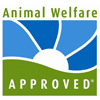 Started in 2006, Animal Welfare Approved (AWA) is a division of the non-profit organization Animal Welfare Institute. Its standards cover the way its participating farms raise their animals (including beef and dairy cattle, bison, sheep, goats, pigs, chickens, turkeys, ducks, geese and rabbits). AWA states that the basic premise of their standards is that animals must be able to behave naturally and be in a state of physical and psychological well-being. They only certify family farms (charging no fees to participating farmers) and state that animals must be raised on pasture or range.
Started in 2006, Animal Welfare Approved (AWA) is a division of the non-profit organization Animal Welfare Institute. Its standards cover the way its participating farms raise their animals (including beef and dairy cattle, bison, sheep, goats, pigs, chickens, turkeys, ducks, geese and rabbits). AWA states that the basic premise of their standards is that animals must be able to behave naturally and be in a state of physical and psychological well-being. They only certify family farms (charging no fees to participating farmers) and state that animals must be raised on pasture or range.
American Humane Certified
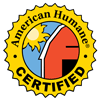 The American Humane Certified program (formerly the Free Farmed program) was created by the American Humane Association in 2000 to ensure that animals raised for dairy, poultry, beef, veal, goat, swine, turkey and bison products are raised in a humane manner. These guidelines, created with input from animal science experts, ensure that livestock have access to clean and sufficient food and water as well as a safe, healthy living environment and that staff and managers are thoroughly trained to care for animals in a humane manner.
The American Humane Certified program (formerly the Free Farmed program) was created by the American Humane Association in 2000 to ensure that animals raised for dairy, poultry, beef, veal, goat, swine, turkey and bison products are raised in a humane manner. These guidelines, created with input from animal science experts, ensure that livestock have access to clean and sufficient food and water as well as a safe, healthy living environment and that staff and managers are thoroughly trained to care for animals in a humane manner.
Non-GMO Project Verified
 The Non-GMO Project is a non-profit organization that provides the only third-party labeling program in North America for products grown without using genetic engineering. They verify that the process products go through, from seed to shelf, are produced according to their rigorous best practices for GMO avoidance.
The Non-GMO Project is a non-profit organization that provides the only third-party labeling program in North America for products grown without using genetic engineering. They verify that the process products go through, from seed to shelf, are produced according to their rigorous best practices for GMO avoidance.
Grassfed
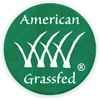 USDA has a grass fed standard for ruminant animals like cows and goats, which states that these animals must be fed only grass and forage during the growing season. The American Grassfed Association is one organization that certifies beef, bison, dairy, lamb and goat that is fed only on pasture, in addition to being raised without antibiotics, synthetic hormones, confinement and with standards for high animal welfare. Other animals, like chicken and pigs can be pasture-raised (and USDA organic standards require at least some access to pasture), but there are currently no specific certification standards for non-ruminant animals being grass fed or pastured.
USDA has a grass fed standard for ruminant animals like cows and goats, which states that these animals must be fed only grass and forage during the growing season. The American Grassfed Association is one organization that certifies beef, bison, dairy, lamb and goat that is fed only on pasture, in addition to being raised without antibiotics, synthetic hormones, confinement and with standards for high animal welfare. Other animals, like chicken and pigs can be pasture-raised (and USDA organic standards require at least some access to pasture), but there are currently no specific certification standards for non-ruminant animals being grass fed or pastured.
Non-Certified Labels
The following labels depend on farmer and processor information to support the claim that the food products were raised in compliance with each set of standards. However, they are not certified or tested by any third party regulatory agency:
Hormone-Free / rBGH-Free
This label means that the farmer has chosen not to inject his or her cows with any artificial growth hormones, like rBGH, a genetically engineered growth hormone. The label is also used on beef and chicken products, where the animal was raised without growth hormones or steroids. However, the USDA prohibits giving hormones to chickens, so the label doesn’t mean much there — all chicken you buy will be hormone-free whether it’s labeled or not.
Raised Without Antibiotics
Chickens, pigs, and cattle raised on industrial farms are routinely fed low doses of antibiotics (the same drugs we rely on to keep ourselves and our families in good health) to make them grow faster and compensate for overcrowding and unsanitary living conditions. This label states the meat or dairy was raised without the use of antibiotics.
GE-Free / Non-GMO
There are no federal regulations on labeling of food products containing genetically engineered (GE) ingredients or genetically modified organisms (GMOs); however, there are many companies that have taken the initiative to label their products as GE-Free or Non-GMO to protect consumers. Food products that use GE-Free or Non-GMO labels are regulated by individual companies and organizations and establish varying degrees of GMO allowance in their products, ranging from 100% GE-Free to trace levels of GMOs allowed in products. Often, the companies require certification or affidavits from farmers that the materials were not genetically modified in any way.
The following are not certified or tested by any third party regulatory agency and do not have a set of standards to which they adhere, so you should ask questions to learn more for each specific product:
All Natural
While many products have “all natural” labeling or packaging, there is no universal standard or definition for this claim.
Free-Range
Free-range poultry is defined as birds that spend part of their time outside (whether that’s 10 minutes per month or 10 hours per day) and don’t live in cages. However, the USDA doesn’t have a legal definition of free-range chicken eggs and there are also no standardized or regulated definitions for free-range beef or pork.

